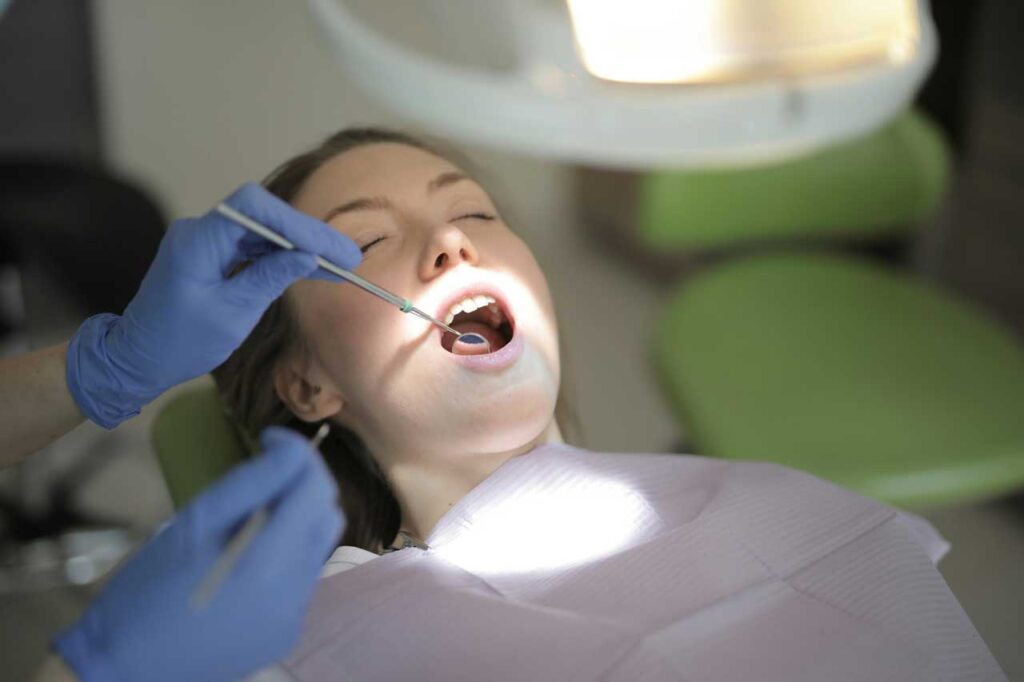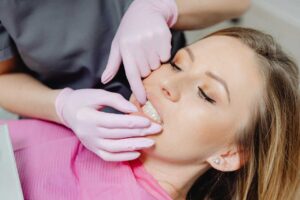
Having a bright, healthy smile goes beyond just appearances—it’s essential for your overall health and well-being. Proper oral care is not only about brushing your teeth; it also involves taking care of your gums, preventing cavities, and maintaining healthy habits. In this blog, we will explore 10 essential tips to help you maintain healthy teeth and gums and ensure a confident smile that lasts a lifetime.
Oral health is a reflection of your overall health, and the state of your teeth and gums can impact various aspects of your life. Poor oral hygiene can lead to tooth decay, gum disease, and even more severe conditions like heart disease, diabetes, and respiratory issues. By maintaining healthy teeth and gums, you can avoid these complications and improve your quality of life.
Are you concerned about your oral health? Visit Best Doctor for expert advice and dental care services to maintain healthy teeth and gums.
1. Brush Your Teeth Twice a Day
Brushing your teeth is the most fundamental part of maintaining oral hygiene. It helps remove plaque—the sticky, colorless film of bacteria that forms on your teeth—preventing cavities and gum disease.
Best Practices for Brushing
- Use Fluoride Toothpaste: Fluoride helps to prevent cavities and strengthens tooth enamel. Choose a toothpaste that contains fluoride to protect your teeth from decay.
- Brush for Two Minutes: It’s important to brush for at least two minutes, making sure to reach every surface of your teeth: the front, back, and chewing surfaces.
- Use a Soft-Bristled Toothbrush: A soft-bristled toothbrush is gentle on your gums and tooth enamel while still effective at removing plaque.
- Replace Your Toothbrush Regularly: Change your toothbrush every three to four months or sooner if the bristles are frayed.
Pro Tip: Invest in an electric toothbrush for more efficient plaque removal. The automatic oscillation of an electric toothbrush can help ensure that you brush each tooth thoroughly.
2. Don’t Forget to Floss
Flossing may seem like an extra task, but it plays a crucial role in preventing cavities and gum disease. While brushing removes plaque from the surface of your teeth, flossing reaches areas that your toothbrush can’t, particularly between your teeth.
Why Flossing Matters
- Prevents Gum Disease: Flossing helps to remove food particles and plaque buildup from between your teeth and along the gum line, reducing your risk of gum disease.
- Fights Bad Breath: By removing trapped food particles, flossing can also help reduce bad breath, keeping your mouth fresh.
How to Floss Properly:
- Take a piece of dental floss about 18 inches long and wrap the ends around your fingers.
- Gently slide the floss between your teeth, curving it around each tooth to clean the surfaces.
- Be sure to floss below the gum line to remove bacteria and plaque from the gums.
If you find traditional floss difficult to use, you can opt for floss picks or a water flosser, which can be just as effective at cleaning between teeth.
3. Visit Your Dentist Regularly
Regular dental check-ups are essential for maintaining your oral health. Even if you brush and floss every day, you may not be able to remove all plaque and tartar buildup on your own. Professional cleanings ensure that your teeth remain healthy, and your dentist can spot any potential issues early.
What Happens During a Dental Check-up?
- Teeth Cleaning: Your dentist or hygienist will remove tartar and plaque buildup from your teeth and gums, reducing your risk of gum disease.
- Exams for Cavities and Other Issues: Your dentist will check for cavities, gum disease, tooth damage, and other issues that might affect your oral health.
- X-rays: Dentists may use X-rays to examine your teeth and gums for any hidden problems that may not be visible to the naked eye.
Recommendation: Visit your dentist every six months for a check-up and cleaning. However, if you have certain health conditions or are at higher risk for oral health issues, your dentist may recommend more frequent visits.
4. Eat a Balanced Diet
A healthy diet is just as important for your teeth as brushing and flossing. The foods you eat provide the necessary nutrients for strong teeth and healthy gums. Certain foods can also contribute to the development of cavities and gum disease, so it’s essential to make informed choices.
Foods to Promote Healthy Teeth:
- Dairy Products: Milk, cheese, and yogurt are rich in calcium, which strengthens tooth enamel and helps prevent tooth decay.
- Leafy Greens: Vegetables like spinach, kale, and broccoli are high in vitamins and minerals, including folic acid, which is essential for gum health.
- Crunchy Fruits and Vegetables: Apples, carrots, and celery help clean teeth naturally, stimulating saliva production and removing food particles.
- Nuts and Seeds: These foods are high in healthy fats and provide essential nutrients like calcium and magnesium.
Foods to Avoid for Better Oral Health:
- Sugary Snacks: Candy, soda, and other sugary foods feed harmful bacteria in your mouth, which can lead to cavities and gum disease.
- Acidic Foods and Drinks: Citrus fruits, wine, and coffee can erode enamel over time, increasing your risk of tooth sensitivity and cavities.
- Sticky Foods: Foods like caramel and dried fruit can stick to your teeth, promoting plaque buildup.
Pro Tip: Drink plenty of water throughout the day to keep your mouth hydrated and help rinse away food particles and bacteria.
5. Quit Smoking
Smoking is one of the most harmful habits for your oral health. Not only does it stain your teeth, but it also significantly increases your risk of gum disease, tooth decay, and even oral cancer. Smoking weakens the immune system, making it harder for your body to fight off infections, including gum disease.
Benefits of Quitting Smoking for Oral Health:
- Healthier Gums: Quitting smoking reduces your risk of gum disease and helps your gums heal faster if you already have gum issues.
- Brighter Teeth: Smoking stains teeth and causes yellowing, so quitting will help maintain a whiter, healthier smile.
- Reduced Risk of Oral Cancer: Smoking is one of the leading causes of oral cancer, so quitting can significantly lower your risk.
If you’re looking for support in quitting smoking, ask your dentist for advice on resources or programs that can help.
6. Limit Acidic and Sugary Drinks
Acidic and sugary beverages like soda, sports drinks, and fruit juices are some of the worst culprits when it comes to tooth decay and enamel erosion. These drinks can break down tooth enamel, leading to cavities, sensitivity, and other dental issues.
Why They’re Harmful:
- Sugar: Sugar feeds bacteria in your mouth, contributing to plaque buildup, cavities, and gum disease.
- Acidity: Acidic drinks like soda and fruit juice can wear away the enamel on your teeth, leaving them vulnerable to decay and sensitivity.
How to Protect Your Teeth:
- Drink Water: Water is the best choice for keeping your teeth clean and hydrated.
- Use a Straw: If you do drink acidic or sugary beverages, use a straw to minimize contact with your teeth.
Rinse Your Mouth After Drinking: If you drink soda or juice, rinse your mouth with water to wash away any harmful acids and sugars.
7. Protect Your Teeth from Injury
Accidents and injuries can cause serious dental damage. Whether you’re playing sports, engaging in physical activities, or even just chewing on hard foods, protecting your teeth is essential to avoid fractures, chips, and other injuries.
Ways to Protect Your Teeth:
- Wear a Mouthguard: If you play contact sports, wearing a mouthguard can prevent tooth damage and protect your gums from injury.
- Be Careful What You Chew: Avoid chewing on ice, hard candy, or pens, as these can crack your teeth and cause fractures.
- Don’t Use Your Teeth as Tools: Never use your teeth to open packages or bottles, as this can lead to cracks and chips.
8. Use Mouthwash
Mouthwash is a great supplement to your daily oral hygiene routine. It helps freshen your breath, reduces plaque, and fights bacteria that cause gum disease and tooth decay.
Benefits of Mouthwash:
- Fights Bacteria: Mouthwash helps to reduce harmful bacteria in your mouth, which can lead to gum disease and cavities.
- Freshens Breath: It leaves your mouth feeling clean and fresh, reducing bad breath.
- Strengthens Teeth: Some mouthwashes contain fluoride, which helps to remineralize teeth and prevent cavities.
Pro Tip: Choose a mouthwash that is alcohol-free to avoid drying out your mouth and causing irritation.
9. Manage Stress
Stress can have a significant impact on your oral health. Chronic stress can lead to teeth grinding, gum disease, dry mouth, and even canker sores. Managing your stress levels can prevent these issues and help protect your oral health.
Stress Management Tips:
- Exercise Regularly: Physical activity helps to reduce stress hormones and promotes overall health.
- Practice Relaxation Techniques: Meditation, yoga, and deep breathing exercises can help alleviate stress and promote relaxation.
- Get Enough Sleep: Lack of sleep increases stress and affects your immune system, which can impact your oral health.
10. Be Aware of Medications and Health Conditions
Certain medications and health conditions can affect your oral health. Medications that cause dry mouth, gum enlargement, or affect your immune system can increase your risk of dental problems. It’s essential to inform your dentist about any medications or health conditions you have so they can provide tailored advice for your oral care.
Medications That Can Affect Oral Health:
- Antihistamines and Decongestants: These can cause dry mouth, increasing the risk of cavities and gum disease.
- Blood Pressure Medications: Some blood pressure medications can lead to gum enlargement, making it harder to clean your teeth properly.
If you’re taking medications that affect your oral health, ask your dentist for recommendations on how to manage these effects and maintain a healthy mouth.
Conclusion
Maintaining healthy teeth and gums requires a combination of good oral hygiene habits, healthy lifestyle choices, and regular visits to your dentist. By following these 10 tips, you can keep your teeth and gums in excellent condition and prevent many common dental problems.
Looking for expert dental care? Visit 32 Dental Care for more information or to schedule an appointment with our dental professionals.
By adopting these habits, you’ll not only enjoy a healthier mouth but also improve your overall well-being. Start today for a brighter, more confident smile!




One Response